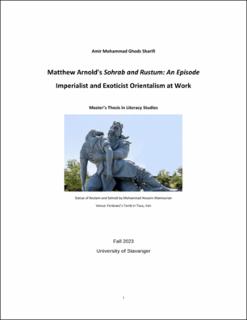| dc.description.abstract | Abstract
Matthew Arnold’s Sohrab and Rustum: An Episode (1853) is perhaps the most famous adaptation of Abolqasem Ferdowsi’s Persian epic Shahnameh (Book of Kings). It retells the story of Sohrab, the Tartar hero, who fights Rustum, the Persian chieftain, in single combat, not knowing that he is truly his father. Rustum who does not believe he has ever had a son mortally wounds Sohrab in the battle and the tragedy ends with Sohrab’s death on the banks of the Oxus.
Arnold creates two different worlds to depict the rivalry between the father and son. Sohrab comes from the East where almost everything implies darkness, discord, and backwardness. Colors in the East are either black, grey, or white. The country is nameless, the architecture is primitive, and the water from the rivers is full of salt. On the other hand, the west, which is paradoxically a part of the Orient at the same time, is full of colors, has an established history, a modern army, and impressive architecture. All these binary opposites portray a distinction between the East and West, which is also reflected in the contemporary geopolitics of the Victorian era in a parallel setting.
The opposition is not limited to imagined geographies, colors, and architecture. There is a confrontation between masculinity and femininity as well which is represented by and through the protagonists. Gender roles, however, are not exclusively assigned to human characters alone. Animals, plants, and inanimate objects also have masculine/feminine attributes at times.
This research intends to explore the binary opposites concerning the East/West and masculine/feminine dichotomies, and find out the scope and nature of imperialist versus exoticist Orientalism employed by Arnold in his poem. Close readings of similes and relevant excerpts from the poem, in addition to engagement with critical sources pertaining to Orientalism and Victorian art and literature form the basic methodology of this endeavor. | |
